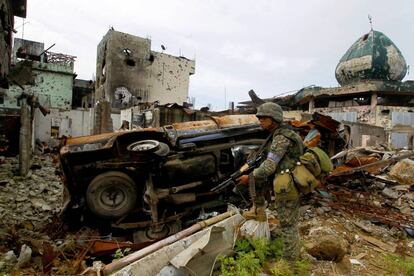The Philippines is a Microcosm of the Challenges Facing Asia
The archipelago, a good place to start to understand the continent, faces a great many political, economic and social difficulties, including the rise of China and an ethnic separatist movement

If you want to understand Asia, a good place to start is the Philippines. The Philippines faces a great many political, economic and social challenges, including the rise of China, ailing governance, a weak rule of law and an ethnic separatist movement that has developed transnational linkages with ISIS. In the broader Asian context these challenges aren’t unique to the Philippines. Rather, they exemplify some of the more troubling trends in many Asian countries.
Balancing Between Great Powers
The rise of China has changed the geopolitical context in which the Philippines operates. In recent years China has established new military bases across the Indo-Pacific region, and more of China’s military is now stationed close to the Philippines. This allows China to exert coercive (and often unseen) pressure on the Philippines in a range of diplomatic settings and negotiations. In much the same way, almost every country in Asia has had to reconsider its foreign and defense policies to reflect China’s expanding power and interests.
While the Philippines struggles to respond to China’s rise, it must also deal with the US presence in the region and the growing rivalry between these powers. This was on show recently in Vice-President Mike Pence’s speech at the APEC Summit. The Philippines and the rest of Asia must balance between an increasingly weighty China and an unpredictable US.
Maritime Territorial Disputes
The Philippines is part of an ongoing dispute over a large part of the South China Sea. There are multiple claimants to the dispute, including China, Vietnam, Taiwan, Brunei and Malaysia. The previous Philippines government took China to The Hague for an arbitral ruling on the competing claims. The Philippines won, but China refused to acknowledge the court’s ruling due to lack of jurisdiction.
The Indo-Pacific region is host to several other maritime disputes including contested islands between Russia-Japan, Japan-South Korea and Japan-China. In this sense, the Philippines’ maritime dispute is typical of the region where disputes over key islands, waterways and underwater oil and gas deposits are reasonably common among the diverse, coastal states.
Governance and Rule of Law
Like many Asian countries, the Philippines is known for poor governance and weak rule of law. Since taking office, President Rodrigo Duterte has asserted himself through a brutal war on drugs which some have called a “campaign of mass atrocities”. He has openly called for police and vigilantes to engage in the extrajudicial killing of drug users and dealers.
Meanwhile, Duterte’s domestic approval ratings remain extremely high with a recent survey indicating 79% of the population were satisfied with him. So why aren’t the Filipino people unhappier about Duterte’s drug war? The answer is that in Asia, drug-crime is taken very seriously. Drug-related violence is a much bigger, more politically complex problem than in most of the world and is often seen as a threat to national security. Of the 33 countries that execute drug offenders, 15 are in Asia.
The move to extrajudicial killings is new and unusual. But it is having a demonstration effect in the region, with the chief of Indonesia’s Anti-Narcotics Board commenting that Indonesia would soon be as aggressive on drug-crime as the Philippines. Over the past 4 years, the Philippines’ corruption rankings have worsened and are among the world’s worst. While President Duterte came to power on a wave of anti-corruption rhetoric and campaign promises, concrete outcomes remain to be seen.
Corruption has significant effects. When corruption is rife, foreign investors usually can’t access local networks of patronage to facilitate backdoor deals, and often refuse to bribe local officials for fear of legal repercussions at home. This discourages investment and hinders growth. Corruption is a major challenge on the road to achieving greater prosperity and better standards of living for the Filipino people. In the Asian context, it is also a familiar problem that few countries have managed to combat effectively.
Piracy
Piracy is also a major problem in the Philippines. The Sulu and Celebes Seas to the west and south of the Philippines are rapidly becoming global piracy hotspots. Key waterways in the area have been host to a recent rash of sea kidnappings. Reports indicate that a number of these kidnappings have been executed by Abu Sayyaf, a militant extremist group with links to ISIS. This problem is not unique to the Philippines. In 2016 Asia had the highest rates of piracy in the world.
Ethnic unrest and terrorism in Mindanao
The Philippines is also plagued by a centuries-old ethnic conflict on the southern island of Mindanao. Last year a coalition of militant extremist groups formed together in Mindanao and pledged allegiance to ISIS. The group occupied the city of Marawi for five months, resulting in a prolonged siege. Reports indicate that the extremist group included foreign fighters who had gained combat training and experience in Iraq and Syria.
Other countries in Asia have also had their share of ethno-religious unrest in the recent past. The southern provinces of Thailand have suffered from an ongoing violent separatist movement since 1948. Like the Mindanao conflict, this insurgency has evolved in recent years to become more violent and ideologically extreme, developing both real and ideological linkages with Islamic extremist groups in the Middle East. In the past Indonesia has struggled with localised ethnic separatist movements in Aceh and West Papua.
Facing the challenges
The Philippines provides a case study of many of the social, economic and political problems common across Asia. On independence, the Phillipines was seen as one of the countries most likely to succeed. Sadly, it has not lived up to this promise. Today the concern is that it is going backwards rather than forwards on many of its challenges.
If you want to learn about Asia’s challenges, a good place to start is looking at the problems faced by the Philippines. Asia as a whole needs to find ways to solve or mitigate the problems that hold countries back.
* Melissa Conley Tyler is National Executive Director of the Australian Institute of International Affairs. She tweets at @MConleytyler. Rory MacNeil is a former AIIA researcher who works at the Philippines Project at The Australian National University
Tu suscripción se está usando en otro dispositivo
¿Quieres añadir otro usuario a tu suscripción?
Si continúas leyendo en este dispositivo, no se podrá leer en el otro.
FlechaTu suscripción se está usando en otro dispositivo y solo puedes acceder a EL PAÍS desde un dispositivo a la vez.
Si quieres compartir tu cuenta, cambia tu suscripción a la modalidad Premium, así podrás añadir otro usuario. Cada uno accederá con su propia cuenta de email, lo que os permitirá personalizar vuestra experiencia en EL PAÍS.
¿Tienes una suscripción de empresa? Accede aquí para contratar más cuentas.
En el caso de no saber quién está usando tu cuenta, te recomendamos cambiar tu contraseña aquí.
Si decides continuar compartiendo tu cuenta, este mensaje se mostrará en tu dispositivo y en el de la otra persona que está usando tu cuenta de forma indefinida, afectando a tu experiencia de lectura. Puedes consultar aquí los términos y condiciones de la suscripción digital.




























































